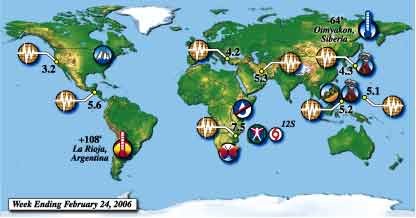Ice-free Winter
Unusually warm weather this winter across the northeastern
United States and eastern Canada has left the Great Lakes mostly
free of ice for the first time in living memory. The open waters
have been disastrous for the ice-fishing industry in the region and
have allowed ferries to operate even during the coldest month of
January.
By Steve Newman
Ice-free Winter
Unusually warm weather this winter across the northeastern United States and eastern Canada has left the Great Lakes mostly free of ice for the first time in living memory. The open waters have been disastrous for the ice-fishing industry in the region and have allowed ferries to operate even during the coldest month of January. Some fishing guides tried to use boats for their customers, but high winds clouded the waters, preventing fish from seeing the lures. A cold wave that spread across the Great Lakes region in mid-February promoted the formation of ice near shore, but it is unlikely that an extensive ice sheet will form over the bodies of water this season.
Philippine Slide Disaster
A massive landslide that swallowed an entire farming village on the central Philippine island of Leyte buried an estimated 1,000 people alive. Most of the St. Bernard town’s survivors are now widowers because the majority of women were at home, tending children while their husbands worked in fields away from the disaster site. An international relief team made a desperate attempt to find survivors beneath the 100-foot layer of muck that blanketed the village after a nearby hillside collapsed. Some relief officials blamed illegal logging for weakening the hillside.
Indian Ocean Cyclone
Weak tropical cyclone 12S formed briefly near the Indian Ocean island of Mauritius. The disturbance attained tropical storm force only briefly before dissipating to the south of the island.
Earthquakes
A wide area of southern Africa was soundly shaken by a magnitude 7.5 temblor centered in western Mozambique.
Earth movements were also felt in southern Bulgaria, central Iran, central Japan, the southern Philippines, Guam, Nicaragua and neighboring Honduras as well as in central parts of the San Francisco Bay Area.
Volcanoes
The central Philippines’ Mayon Volcano produced a swarm of hundreds of quakes that sprayed ash across the mountain’s slopes. The country’s vulcanology and seismology institute advised residents to stay outside a 4-mile radius of the mountain in anticipation of further activity.
A volcano on the small Japanese island of Miyake produced its first eruption since last May, releasing a small amount of ash. An eruption in July 2000 forced all of the island’s 4,000 residents to evacuate.
Drought Casualties
The ongoing severe drought across much of East Africa has killed tens of thousands of animals, and experts warn it will “decimate” livestock during the next few months. The British-based Society for the Protection of Animals Abroad said further deaths of cattle, camels and donkeys across Kenya and Somalia are likely to add to drought-related human fatalities and suffering. Parched conditions are also disrupting the annual migrations of wildebeests and zebras in Kenya and neighboring Tanzania. The Kenya Wildlife Service said the drought has so far killed at least 60 hippopotamuses in the country’s wildlife sanctuaries.
Indian Ocean Outbreak
Health officials on the Indian Ocean island of Reunion say that four people have now died from a mosquito-borne disease that has infected more than 100,000 people on the French overseas territory. Hospital officials said the latest victim was a small child, who died from complications related to chikungunya, a crippling disease that causes painful swelling of body joints and leaves victims stooped with limited mobility. Victims usually recover from the symptoms over time. While the disease had not previously been known to be fatal, chikungunya is now being directly connected to the deaths of two adults and two children on the island. A massive mosquito-eradication project has been launched to combat the spread of the disease.
Bounterful Butterflies
Exceptionally wet weather across South Africa in recent months is responsible for the unprecedented numbers of white butterflies that have delighted residents of Johannesburg during February, according to wildlife experts. Zoologist Graham Alexander said wet conditions promoted plant growth, providing a home for more caterpillars. They eventually turned into millions of Belenois aurota, commonly known as “brown-veined white” butterflies. While the species is common across southern Africa, older residents of the city say they have never before seen them in such great numbers. Large migrations of Belenois aurota take place during the rainy season, with the winged insects flying up the east coast of Africa.












